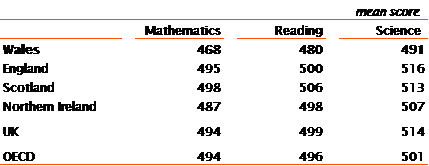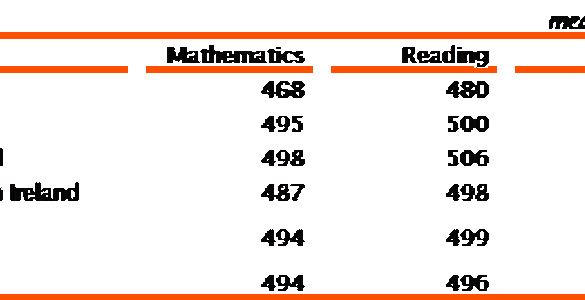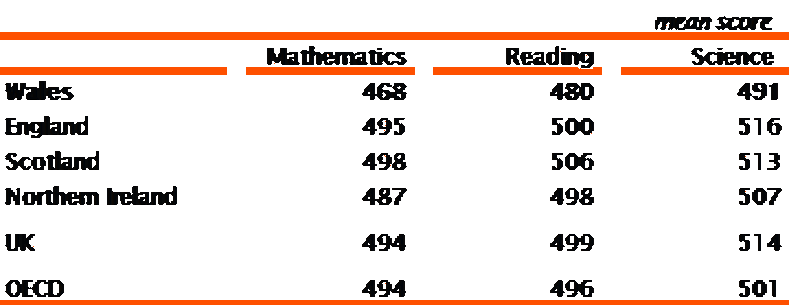Article by Michael Dauncey, National Assembly for Wales Research Service
The last Welsh Government prioritised improving standards and performance in schools after disappointing PISA results delivered a ‘shock to the system’. Will this approach continue and what are the main challenges?
The focus the Welsh Government placed on school standards and performance during the Fourth Assembly was unprecedented. Ministers admitted previous governments of their own political colour may have taken their ‘eye off the ball’. The new Welsh Government will need to decide whether to continue with the same approach as its predecessor in dealing with these challenges. [caption id="attachment_6655" align="alignright" width="300"] Image from Pixabay. Licensed under the Creative Commons.[/caption]
Image from Pixabay. Licensed under the Creative Commons.[/caption]
PISA’s influence
In December 2010, Leighton Andrews, the then Minister for Children, Education and Lifelong Learning, described Wales’s results in the 2009 Programme for International Student Assessment (PISA) as a ‘wake up call to a complacent system’. The plans he initiated in response were centred around a renewed focus on literacy and numeracy as well as greater accountability and stronger leadership and management in schools. The 2012 PISA results were not much better with Wales scoring lower than England, Scotland, and Northern Ireland, as well as the Organisation for Economic Co-operation and Development (OECD) average. However, the Welsh Government stressed that its reforms were still bedding in and it would take years to meet the challenges highlighted by PISA. In early 2016, Huw Lewis, the then Minister for Education and Skills, reflected that the 2009 results delivered a ‘shock to the system’ and that ‘so much has changed as a result of PISA’.
Programme for International Student Assessment (PISA)
- surveys aptitude of 15 year olds in reading, maths and science
- run by OECD in the year cycles
- countries scored and ranked by results of their sample’s performance
An education improvement plan
The previous Welsh Government published its education improvement plan, Qualified for Life, in 2014. This was partly in response to a review it commissioned from the OECD (2014) which concluded there was a lack of long-term vision and lack of a clear strategy for school improvement. [caption id="attachment_6650" align="alignright" width="300"] PISA 2012 scores[/caption] Qualified for Life sets out a package of reforms planned until 2020, based around four strategic objectives:
PISA 2012 scores[/caption] Qualified for Life sets out a package of reforms planned until 2020, based around four strategic objectives:
- an excellent professional workforce;
- an engaging and attractive curriculum;
- internationally respected qualifications; and
- a self-improving system with strong leadership
The previous Welsh Government also committed to publishing an annual Wales Education Report Card setting out what it had done against each strategic objective. It published the first Wales Education Report Card in March 2016. This reported that the Welsh Government had made progress at each phase of education and was narrowing the attainment gap at every key stage between pupils eligible for free school meals and their peers. However, the Association of Teachers and Lecturers (ATL) argued the report card did not provide the whole picture. The ATL referred to the latest annual report from the inspectorate, Estyn, and said the Minister was ‘marking his own homework’. [caption id="attachment_6652" align="aligncenter" width="586"] Pupil achievement in Wales, by eligibility for free school meals
Pupil achievement in Wales, by eligibility for free school meals
Note: Level 2 threshold inclusive = 5 or more GCSEs at grades A*-C including Mathematics and English/Welsh, or equivalent[/caption]
Challenges highlighted by Estyn
It is clear that the new Welsh Government will have a number of challenges to overcome if it wants to improve school standards and pupil outcomes. Some of these were highlighted by the Estyn Chief Inspector’s 2014/15 annual report. He concluded that although progress has been made, more remains to be done. Reporting on the sample of schools inspected in 2014/15, the Chief Inspector said:
- there is a ‘variability in standards’ and too wide a gap between the best and worst performers which cannot be explained simply by socio-economic factors;
- only half of secondary schools have suitable plans for literacy and numeracy. In the other half, planning across the curriculum is ‘weak’;
- teaching is good or better in only around half of secondary schools. In the other half, ‘the quality of teaching is inconsistent and activities are not challenging enough’; and
- good leadership ‘makes the biggest difference’ to the quality of a school’s provision.
Future policy and the PISA 2015 results
In the final weeks of the Fourth Assembly, the then Minister claimed there was a ‘new momentum’ in education. He pointed to improved GCSE results and a narrowing of the poverty attainment gap, which was one of his top priorities. The Welsh Government’s target for improvement in PISA is long-term: scores of 500 in each of the three domains (reading, mathematics and science) by 2021. However, the results of the 2015 cycle will be published in December 2016 and should show how much impact the raft of reforms over the past four or five years have had. In January 2016, the then Minister told the Fourth Assembly’s Children, Young People and Education Committee that evidence of ‘an entire system moving forward … must be reflected in [those] PISA results’. The previous Welsh Government said it would not let up the drive for improvement. However, will the new Welsh Government, and the new Liberal Democrat Cabinet Secretary, place so much stock on PISA and will they continue with the reforms already underway? If not, what approach will they take?
Key sources
- Estyn, HM Chief Inspector’s Annual Report 2014/15 (2016)
- National Foundation for Educational Research, Achievement of 15 year olds in Wales: PISA 2012 National Report (2013)
- OECD, Improving Schools in Wales (2014)
- Research Service, Education policy learning towards PISA? (2015)
- Research Service, PISA 2012 (2013)
- Welsh Government, Achievement and entitlement to free school meals (2015)
- Welsh Government, Performance and standards (2011)
- Welsh Government, Qualified for Life: An education improvement plan for 3 to 19 year olds in Wales (2014)
- Western Mail, Minister criticised over education report card (Hard copy) (2016)






